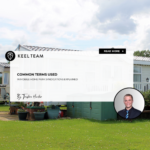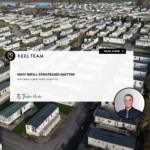The Challenge of Mobile Home Park Zoning
-
 Tristan Hunter - Investor Relations
Tristan Hunter - Investor Relations
It happens every day—neighbors fighting against proposed new mobile home park zoning. This phenomenon, often referred to as “Not In My Backyard” (NIMBY), makes it extremely challenging to get land zoned for building new mobile home parks. The result? Limited supply and historically high demand. Mobile home parks are indeed a rare breed.

The NIMBY Effect on Mobile Home Park Zoning
The NIMBY effect is a significant barrier to the development of new mobile home parks. Neighbors often oppose these projects, fearing that they will lower property values, increase traffic, and disrupt the tranquility of their communities. This resistance can be seen in numerous cases across the country, including Harnett County, North Carolina.
Case Study: Harnett County, North Carolina
In Harnett County, residents of Victoria Hills recently faced a proposal to rezone a 10.5-acre plot of land for a mobile home park. For four years, Brenda Oakley, a resident of Victoria Hills, enjoyed the peace and quiet of her neighborhood. However, a recent proposal threatened to disrupt that tranquility.
“I’m going to be very, very sad. One, my house value is going to go down… I don’t think it is a good thing,” Oakley said. Her sentiment was shared by many of her neighbors, who voiced their opposition at a public hearing. As a result, the Harnett County Commissioners voted unanimously to deny the rezoning request.
Dr. Claudia Elliot, the owner of the nearby property, had sought to rezone the land to allow for the construction of ten manufactured homes. Elliot, who runs New Beginning, a transitional housing organization, believes that the manufactured homes fall under the category of affordable housing. She expressed her disappointment in the decision, suggesting that politics played a role in the commissioners’ unanimous opposition.
Limited Supply and High Demand
The outcome in Harnett County is a clear example of how difficult it is to get land rezoned for manufactured housing. This difficulty contributes to the limited supply, even as demand for affordable housing continues to rise. Mobile home parks generally offer a viable solution to the affordable housing crisis, but ‘NIMBYism’ often stands in the way of their development.
Check out our FREE eBook on the “Top 20 Things I’ve Learned from investing in Mobile Home Parks” to learn more about this asset class!
By Andrew Keel
Strategies for Overcoming NIMBY Opposition
While NIMBY opposition can be a formidable obstacle, there are strategies that developers and advocates can use to increase the likelihood of successfully rezoning land for mobile home parks.
Community Engagement and Education
One effective strategy is to engage with the community early and often. By holding informational meetings and open houses, developers can possibly educate residents about the potential benefits of mobile home parks. These common benefits include providing affordable housing, creating stable communities, and potentially increasing local tax revenue. Addressing residents’ concerns directly and transparently can help mitigate opposition.
Highlighting Economic Benefits
Another strategy is to emphasize the economic benefits that mobile home parks can bring to the community. Mobile home parks can potentially create jobs, increase local spending, and generate property tax revenue. By presenting data and case studies that demonstrate these benefits, developers can make a compelling case for why a mobile home park would be a positive addition to the area.
Building Alliances
Building alliances with local organizations, housing advocates, and government officials can also prove to be beneficial. These allies can provide support and lend credibility to the argument for rezoning. Additionally, having a broad coalition of supporters can help counteract the voices of opposition.

The Importance of Mobile Home Parks
Despite the challenges posed by NIMBYism, the development of mobile home parks is crucial for addressing the affordable housing crisis. Mobile home parks typically offer a unique blend of affordability and community, making them an attractive option for many low- and middle-income families.
Providing Affordable Housing
Mobile home parks generally provide a critical source of affordable housing. The cost of living in a mobile home park is often significantly lower than other forms of housing, making it accessible to families who might otherwise struggle to find affordable accommodation. This affordability is particularly important in areas with high housing costs.
Fostering Community
Mobile home parks also foster a sense of community among residents. With shared spaces and close-knit neighborhoods, residents often form strong bonds and support networks. This sense of community can contribute to a higher quality of life and greater stability for residents.
Sustainable Development
Mobile home parks can be a sustainable form of development. They typically have a smaller environmental footprint than other types of housing developments and can be designed to include green spaces and community amenities. This sustainability makes them an attractive option for cities and towns looking to balance growth with environmental concerns.
Conclusion
The NIMBY effect poses a significant challenge to the development of new mobile home parks. However, by engaging with the community, highlighting economic benefits, and building alliances, developers can increase their chances of overcoming opposition. Mobile home parks are an essential component of the affordable housing solution, providing low-cost housing options and fostering strong communities. Despite the hurdles, their development is crucial in addressing the ongoing affordable housing crisis. As demand continues to outpace supply, finding ways to navigate the challenges of mobile home park zoning will be key to unlocking the potential of mobile home parks as a viable housing option.
Contact us below and explore the world of mobile home park investments with Keel Team! We’re dedicated to improving our communities, the lives of our residents and securing strong returns for our limited partner investors in the process.
Learn more about mobile home park investing.
Interested in learning more about mobile home park investing? Get in touch with us today to find out more.
Disclaimer:
The information provided is for informational purposes only and is not investment advice or a guarantee of any kind. We do not guarantee profitability. Make investment decisions based on your own research and consult registered financial and legal professionals. We are not registered financial or legal professionals and do not provide personalized investment recommendations.

Tristan Hunter - Investor Relations
View The Previous or Next Post
Subscribe Below 👇





